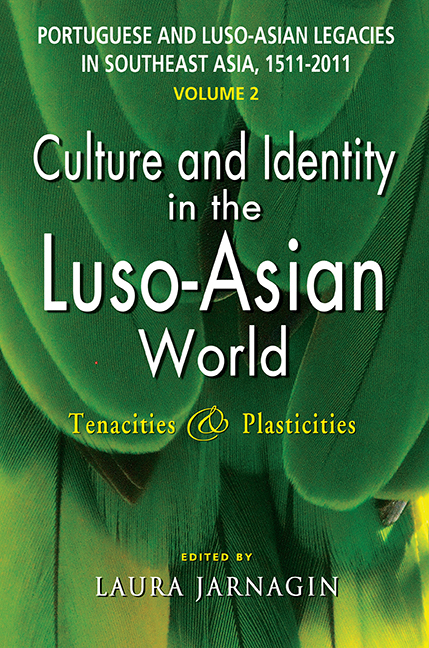 Portuguese and Luso-Asian Legacies in Southeast Asia, 1511-2011, vol. 2
Portuguese and Luso-Asian Legacies in Southeast Asia, 1511-2011, vol. 2 Book contents
- Frontmatter
- Contents
- List of Figures and Tables
- Preface
- List of Contributors
- Glossary
- Introduction: The Qualitative Properties of Cultures and Identities
- Part One Crafting Identity in the Luso-Asian World
- 1 Catholic Communities and Their Festivities under the Portuguese Padroado in Early Modern Southeast Asia
- 2 A “Snapshot” of a Portuguese Community in Southeast Asia: The Bandel of Siam, 1684–86
- 3 The Colonial Command of Ceremonial Language: Etiquette and Custom-Imitation in Nineteenth-Century East Timor
- 4 Remembering the Portuguese Presence in Timor and Its Contribution to the Making of Timor's National and Cultural Identity
- Part Two Cultural Components: Language, Architecture and Music
- Part Three Adversity and Accommodation
- Appendix: Maps
- Bibliography
- Index
- Titles in the Nalanda-Sriwijaya Studies Centre Series
4 - Remembering the Portuguese Presence in Timor and Its Contribution to the Making of Timor's National and Cultural Identity
from Part One - Crafting Identity in the Luso-Asian World
Published online by Cambridge University Press: 21 October 2015
- Frontmatter
- Contents
- List of Figures and Tables
- Preface
- List of Contributors
- Glossary
- Introduction: The Qualitative Properties of Cultures and Identities
- Part One Crafting Identity in the Luso-Asian World
- 1 Catholic Communities and Their Festivities under the Portuguese Padroado in Early Modern Southeast Asia
- 2 A “Snapshot” of a Portuguese Community in Southeast Asia: The Bandel of Siam, 1684–86
- 3 The Colonial Command of Ceremonial Language: Etiquette and Custom-Imitation in Nineteenth-Century East Timor
- 4 Remembering the Portuguese Presence in Timor and Its Contribution to the Making of Timor's National and Cultural Identity
- Part Two Cultural Components: Language, Architecture and Music
- Part Three Adversity and Accommodation
- Appendix: Maps
- Bibliography
- Index
- Titles in the Nalanda-Sriwijaya Studies Centre Series
Summary
Culture is the memory of a people that never dies.
“Manifesto Maubere”, Fernando SylvanCulture is a framework of human adventure, a result of time and space, an attempt to contemplate, understand and transform it in pursuit of an ideal of harmony and perfection. A healthy relationship with nature and with the community in which it is housed are the crucial elements of any culture. The true subject of culture is man himself on the basis of “tradition”. Thus, for the sake of continuity, every human community shapes its own assets so that these are preserved.
Culture cannot exist without society and, likewise, no human society can exist without its culture, because culture is the soul of the human being in all of its branches. In other words, despite cultural variations that distinguish human communities and “because of its cultural legacy, the man moved away from the animal, but has become closely dependent on men. So in order to become a man, it is essential for him to live his life socially and under the influence of all stimuli which provides him with his family and his tribe.” Stuart Hall defines culture as a set of structures of meaning, or a process that has to do with the implementation of joint practice and depends “on its participants interpreting meaningfully what is happening around them, and making sense of the world, in broadly similar ways”.
This chapter will seek to remember the Portuguese presence in Timor and its contribution to the formation of the cultural and national identity of East Timor. First, it describes the initial contacts established by merchants, sailors and Portuguese missionaries with the island of Timor and its people, then goes on to address the cultural traits of the Timorese. Second, this study will examine the results of the long-term Portuguese influence over some 450 years, contrasting these with the consequences of twenty-four years of Indonesian occupation that caused the massive destruction of cultural Timorese entities, among them the “sacred houses”. Third, it will engage in a comparative analysis of Timorese national identity and culture with those of Japan and Korea.
- Type
- Chapter
- Information
- Portuguese and Luso-Asian Legacies in Southeast Asia, 1511-2011, vol. 2Culture and Identity in the Luso-Asian World: Tenacities & Plasticities, pp. 88 - 112Publisher: ISEAS–Yusof Ishak InstitutePrint publication year: 2012


